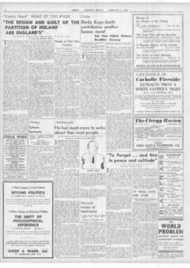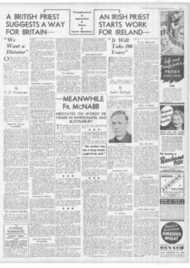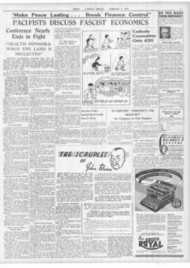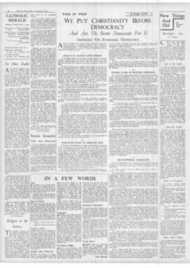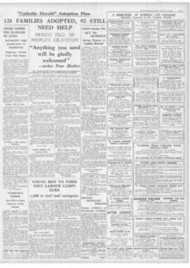Page 5, 3rd February 1939
Page 5
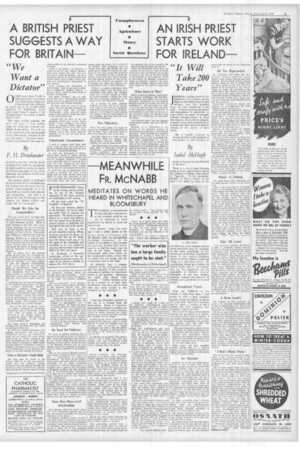
Report an error
Noticed an error on this page?If you've noticed an error in this article please click here to report it.
Tags
Share
Related articles
Social Justice
Spain Policy The Cause
He Has Brought The Catechism To Life
In A Few Words
Are We Sitting On The Church's Dynamite?
A BRITISH PRIEST SUGGESTS A WAY FOR BRITAIN
"We Want a Dictator"
By F. H. Drinkwater
OFTEN now, when I walk in what used to be Ole country near Birmingham, dismayed at the savage ruin of Beauty by Greed, and at the present moral paralysis of Englishmen which allows such things to happen, I feel thankful that I am nearer to death than to birth.
The same feeling possesses rne more and more, I must confess, about the social and economic conditions of our nation. The evils are. on the same lorge scale (on the moral level?) and equally manifest to the eye ; the cause i , the same cause-human Greed allowed full scope un checked by any law—and the moral paralysis is the same too, the absence of public spirit or energy in nearly all citizens, especially in those whose education and position should make them able to lead.
The present article is addressed not to the bewildered and hesitating, but to those who are aware that the present money-monopoly is at the root of all our troubles both national and internationa:, and that it is indeed the real Government of this country, any British Cabinet now being only its instrument.
Should We Join the rresponsibles ?
We are faced with the fact that the said view would seem a fantasy to most ordinary people. What is more serious is the fact that many others, knowing that private finance
rules the country, are yet content that it should continue to do so. Presumably they think it in a natural state of affairs, that it always must be sc., that Mr
Montagu Norman is a kind of semi onielal Minister of State, that perhaps he runs England better than the politicians would. Anyhow, there it is—even those who know the power of finance mostly have no realisation of its terrible consequences.
For us °there, then, the question comes up—is it any use our going on? Is it worth while trying to force the truth on a public that does not want to have it? Wouldn't it be more sensible to Join the cheerful irresponsibles, accept one's share in the universal game of make-believe, choose some attractive way of " escaping " from the hard, unpleasant facts into art or mystical piety or organised charity or what not? If the Great Crash is inevitable, why worry about trying to prevent It?
I think by now we have all despaired In our hearts of preventing it by using the ordinary democratic channele. Democracy, elections, voting, mass meetings, pressure upon candidates, petitions to Parliament—these methods are well enough in theory, they could be used to good purpose in other circumstances—but as things are, and with the existing clumsy Parliamentary procedure, democracy is a useless weapon.
Just as the few intelligent voters are utterly swamped in electorates numbering tens of thousands, so the small voice of reason is utterly drowned by the blaring organs of propaganda—press, radio, cinema, all obedient creatures of the ruling money-monopoly itself.
The mass mind is debauched and drugged and deceived, and our rulers are willing to have it so.
Mr Baldwin's cynical confession, that English rearmament was two years behindhand because the Government could not tell people the truth, was a kind of epitaph which registered the death of democracy for the time being. Every effort to introduce a little reality into the political make-believe comes to nothing: the topical instance, as I write, Is the withdrawal of the farmer's candidate in an East Norfolk by-election.
Only a Dictator Could Help
We have seen the power of the Cabinet (that is, of the money-power which uses the Cabinet) steadily increased and consolidated through the successive crises of depression, Abdication, and Czecho-Munich, until it is now
Impregnable to any attack on democratic lines.
There is no chance, for instance, it seems to me, of any Labour Government ever coming into office, and even if it did it could do nothing. As for a violent revolution of the proletariat, few would desire such a thing, which anyhow is a psychological impossibility in this country.
There remains the alternative of dictatorship. And in fact only a dictator—a temporary dictator without a party, I mean—could do what needs to be done in England.
The word " dictator " has an ugly sound these days. Nevertheless, on that subject there is a good deal of inaccurate language and careless thinking.
To begin with, we must of course admit that the dictator countries, by taking and using the sovereign money-power, have achieved much good in the material order and some in the moral order, too.
Against that we have to set the appalling moral evils—terror, propaganda, active irreligion, bad faith, belief in violence—which mark the dictatorships; or let us say the three great ones, Russia, Germany, Italy, because about the lesser dictatorcountries it is not so easy to get information,
Unfortunate Circumstances
/ want to suggest that these evils really result not from the mere fact of having a dictatorship, but from the fact that it is a party-dictatorship.
In each case thousands; of discontented men found a leader, formed themselves into a disciplined party that was for practical purposes a private army, seized the reins of power by force more or less, suppressed all other parties and reorganised their country on the basis of a one-party Government.
It is all too easy to understand how in such a process the most violent minds and the most extreme ideas are likely to gain the ascendant in the Party, and how even the dictator himself—much more the first dictator's successor—may become the prisoner of the monstrous machine which has emerged from the revolution. Hence the rule of the secret police, the murdering of truth, the military ambitions abroad.
And the corruption. It is comparatively a minor point perhaps, but listen to Mr Beverley Baxter, M.P., just returned from following Mr Chamberlain to Rome. He likes Italy, is friendly to the Duce, enthusiastic about Chamberlain; and this is what he says:—
" Mussolini has done wonders for Italy, but at too great a price. He himself is incorruptible and a sincere patriot He values his place In history above all other considerations. But can you imagine the corruption in a country where there is only one political party which controls all contracts, all appointments, all exceptions from decrees? If only a third of the stories told to me are true, then Fascism is simply waterlogged with bribery and crooked dealing."
No Need for Uniforms
No, there is nothing whatever that I can see to be said in favour of colouredshirt parties and one-party government. It is a remedy worse than the disease. Frankly, I would rather accept the rule of Mr Montagu Norma-n and his City friends, and try to persuade or frighten him to a better treatment of the English poor.
That is the received English system, and already (I think) it bears much too close a resemblance to one-party government. The party is the Conservative party, and some obscure internal rottenness in it, some cancerous entanglement with the money-power, is precisely what I guess is the real cause of England's troubles. But this muddled kind of party-dictatorship, regrettable as it may be, is a kindly and tolerant thing compared with the iron regimes of the totalitarians.
It ought somehow to be possible, in a politically adult nation such as the English nation is, to secure during emergency the advantages of a dictatorship—advantages otherwise unobtainable—while at the same time avoiding the disadvantages of party-dictatorship which have been so clearly revealed abroad over the last twenty years.
There Have Been Good Dictatorships
It is strange, when the word " dictator " is in everybody's mouth, that noone ever seems to mention the original claimants to the name.
In ancient republican Rome, as every schoolboy knows, a temporary dictatorship during emergency was a recognised institution. Some trusted citizen, usually an ex-consul, was summoned from his plough or what not to take supreme
responsibility, with the ordinary rulers acting under his orders, for a period of six months. The emergency over, he retired once more into private life, and could not be called to account for anything he had done during his period of office. Presumably it was a device for getting things done that had to be done but that nobody wanted to have to do: a device that allowed the general will to prevail over what the discreet are accustomed to call " vested interests."
Britain is a larger community than republican Rome was, but there is a wonderful unity about the national mind, and it is still capable of rising to heroic occasions (indeed that was the one comforting conclusion to be drawn from the September crisis).
In a nation of such political maturity as ours, and in an emergency such as we have to encounter now, is there any reason why dictatorship, of a man without a party, should not prove to be the true solution of our troubles, and even the best way of saving democracy?
Two Objectives
There are two things (it would be agreed by thoughtful and disinterested men in every party and every walk of life) that urgently need to be done.
The first thing Is to take back to the nation itself the nation's own money-power, because without this nothing else can be done at all.
The second thing is to bring to birth some kind of Economic Council or Parliament, representative of the various industries and interests, which would have the task of planning the material side of the country's life and of seeing the plans carried out.
These two objectives would form the mandate of the dictator, and he would need more than the Roman Six months to carry it out One of the first details to be attended to (for instance) would be the rescue of English agriculture, which is certainly a matter of years rather than months. Three, four or five years would be the least we could give him.
What Breed of Man?
Where would the dictator come from? The ordinary politicians—the ChamberlaMs, Hoares, and Edens—are too much enmeshed themselves in the present financial system to be given the task of abolishing it All one could say, with irony if you like but also with certainty, Is that England's dictator would be no house-painter or ex-corporal, but one of the governing class, old school-tie and all, and not a notable man in any political party.
"An excellent idea" one can imagine most readers saying, " but quite impracticable."
Whether it is practicable or not depends on the unknown reserves of awareness and will-power in the English character. I like to think it is possible: Supposing it is, then a clear line of action Iles open to men of goodwill who feel some responsibility as citizens. They can do their best to spread the idea of the Good Revolution, and the arguments for a dictator and against a party-dictatorship; and then when the time is ripe, when things are desperate enough, the people of this country will perhaps know what to do.
blog comments powered by Disqus





